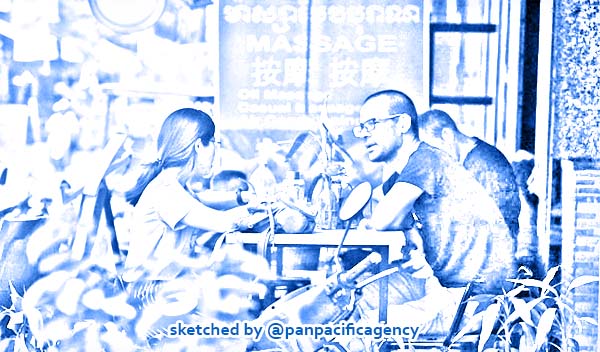Cambodia’s lifting of entry ban will have minimal impact on tourism or economy

Tourists dine close to each other on St 172, Phnom Penh. KT/Chor Sokunthea. Sketched by the Pan Pacific Agency.
PHNOM PENH, May 27, 2020, The Khmer Times. Cambodia lifted a ban on entry of visitors from Iran, Italy, Germany, Spain, France and the United States that had been put in place to curb the spread of coronavirus, the health ministry a week ago and the immediate result of this is the detection of two COVID-19 positive patients, The Khmer Times reported.
The cross signals sent by the Ministry of Health is doing Cambodia no favours as on one hand, Cambodia announced very early on that it would provide free medical treatment for COVID-19 positive victims despite their nationalities.
Thus, the imposition of a $50,000 insurance policy, mandatory upon entry into Cambodia further complicates normalization of inbound passengers into Cambodia.
Despite the easing, foreign visitors would still need to have a certificate no more than 72 hours old confirming that they are not infected with the novel coronavirus and proof of $50,000 worth of health insurance while in Cambodia, the ministry said.
They also would be quarantined for 14 days after arrival at government designate place and tested for the coronavirus, a ministry statement said, but did not specify where.
Airline executives, welcoming the abolishment of minimum tax until July said the tax relief was welcome but too little, too short a period of time and too late as they have been hit severely since the outbreak started peaking in March and when most countries imposed lock downs and flight restrictions.
“The direct result of the extraneous conditions imposed by Cambodia in her attempt to curb the spread of imported cases of the virus is tourism dropping to almost zero and all Asean carriers suspending flights, partly because of the pandemic and partly because of their own severity with the pandemic.
“Cambodia should move to revive air travel and impose less restrictive measures and instead adopt measures to boost air travel. Local businesses, especially hospitality and services sectors are hit severely and since other countries in the region are opening up their economic activities, Cambodia should follow suit and not get left behind,” the executives, fearing reprisal said, declining to be identified.
Asean, they said, should come to a collective decision to open up the skies and air travel and adequate measures should be in place prior to this happening.
“If Asean cannot get its act together, how are they going to tackle the economic crisis looming? Thailand imposes $100,000 insurance requirements, extends emergency but relaxes conditions while Cambodia is sending mixed signals.
“Flights are necessary to stimulate growth one way or another and measures must be adopted to facilitate this, not inhibit as relaxing flight restrictions from the six countries is futile since they still have huge number of cases while Asean with lesser cases have got no ban but no flights as well,” they said.
UNWTO has forecasted a decline in international tourism receipts of between $910 to $1,170 billion in 2020, compared to the $1.5 trillion generated in 2019, with 96% of worldwide destinations having travel restrictions.
IATA has estimated that Cambodia faces a possible direct and indirect job loss of more than 700,000 while in Asia-Pacific as a whole 11.2 million jobs are at risk, including those that are dependent on the aviation industry, such as travel and tourism.
“Providing support for airlines has a broader economic implication. Jobs across many sectors will be impacted if airlines do not survive the COVID-19 crisis. Every airline job supports another 24 in the travel and tourism value chain,” says Conrad Clifford, IATA’s Regional Vice President, Asia-Pacific.